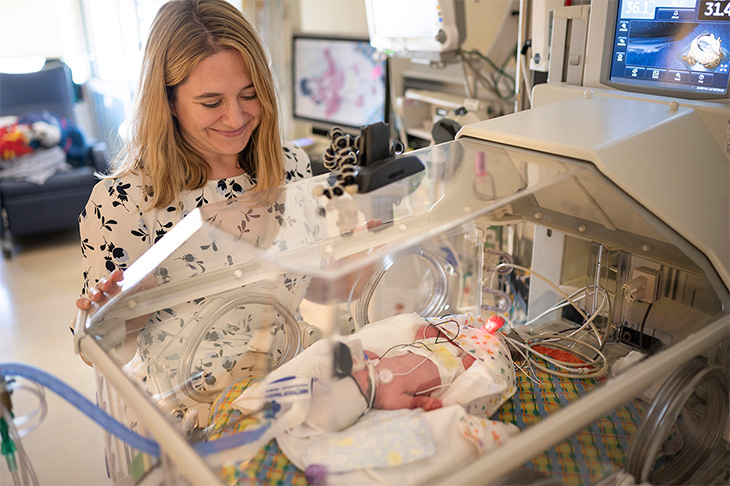Virtual family-centered rounds help parents support their child’s care
In a new study, researchers at UC Davis Children’s Hospital have shown that virtual family-centered rounds are a valuable resource for families with children in the neonatal intensive care unit (NICU). The study was published in the journal Telemedicine and e-Health. It showed that minority families, and those without college educations, particularly benefited. Overall, the virtual option increased attendance and gave families enhanced opportunities to support their child’s care.

Family-centered rounds are designed to improve communication and patient care. Families join the regular morning medical rounds, which generally include physicians, nurses, pharmacists, dietitians and other medical team members. They learn about their child’s condition and care and ask questions. In addition, parents can provide unique information about allergies, the effectiveness of specific medications and other critical insights. Unfortunately, in-person rounds can also be a heavy lift for many families.
“We found that virtual access really improved parent attendance,” said Jennifer Rosenthal, associate professor of Pediatrics and first author on the study. “Those increases were greatest for racial and ethnic minorities, families with no college education and people who lived in neighborhoods with poor health conditions. We are excited because adding this virtual option could overcome some of these inequities.”
Previous research has shown that family-centered rounds boost parents’ confidence in their children’s care, increase parental engagement and improve objective outcomes, such as time spent in the hospital. The researchers reasoned that giving parents the option to use telehealth on their phone or computer to attend rounds remotely could improve attendance.
“Our families often can't be at the bedside,” said Kristin Hoffman, clinical professor of pediatrics and co-author of the study. “Parents have jobs and other kids. Sometimes, the mother is at an outside hospital. Virtual family-centered rounds give them the opportunity to engage with their child’s care without upending their lives.”
Virtual rounds increased participation
The study enrolled and randomized 110 families: 74 who were given the option to participate in the virtual family-centered rounds and 36 controls. Virtual rounds significantly increased participation among racial and ethnic minorities, people with no college education, and those from neighborhoods with worse health conditions.
“With in-person, family-centered rounds, minority participation was much lower,” Hoffman said. “However, with virtual rounds, that gap almost closed, so it has the potential to reduce some of those care disparities.”
In addition to benefiting parents and children, family-centered rounds can also support medical education. UC Davis Children’s Hospital is a teaching hospital, and these interactions give residents and other trainees unique opportunities to engage with families. The research team is also expanding on this work with a new study testing virtual family-centered rounds with professional interpreters for families with language preferences other than English.
“Virtual family-centered rounds have the potential to really level the playing field,” Hoffman said. “They are giving families with barriers to care better opportunities to participate and advocate for their children.”
Co-authors of the study were Hadley Sauers-Ford, of Cincinnati Children’s Hospital Medical Center, and Daniel Stein, Sarah Haynes and Daniel Tancredi, of UC Davis Health.
